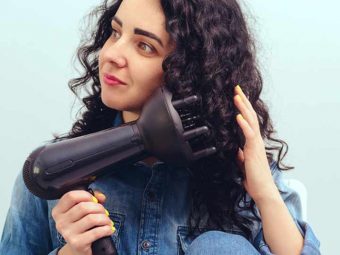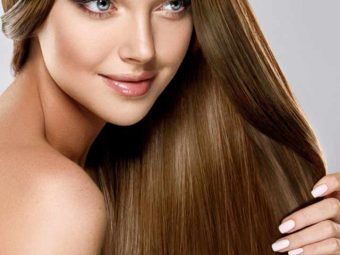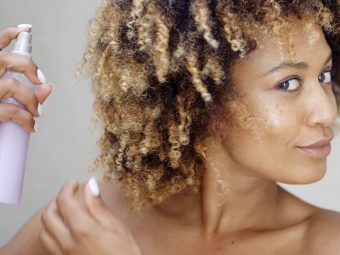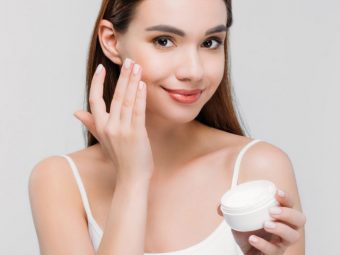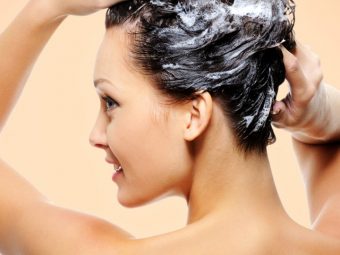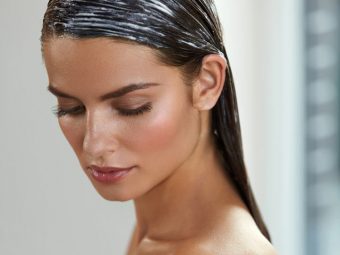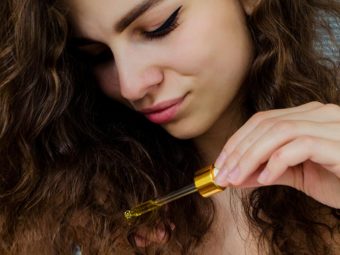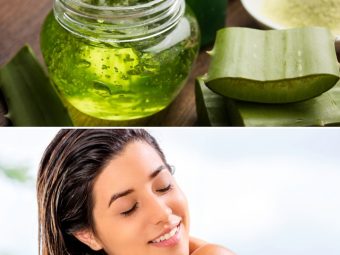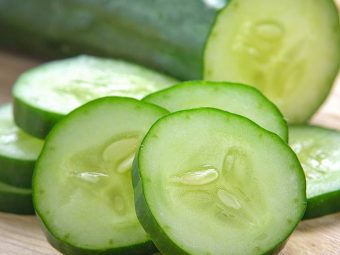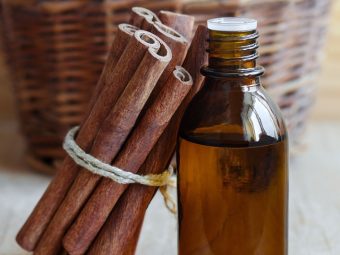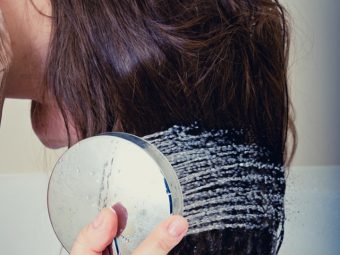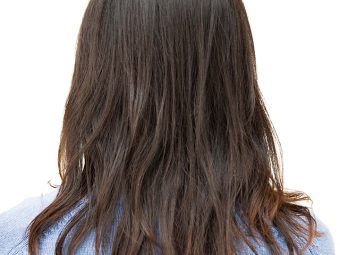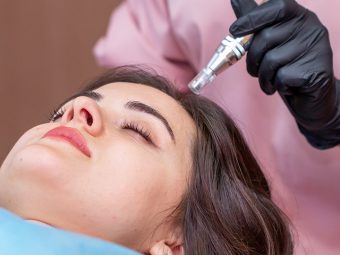Are Silicones Bad For Your Hair? Advantages & Disadvantages

Image: Shutterstock
Most people nowadays prefer shampoos and conditioners without ingredients like parabens and sulfates. But they seem to be confused about silicones. Are silicones bad for your hair? Should you be using hair care products that contain silicones? While some brands boast that silicones protect the hair and prevent frizz, others claim that silicones can leave your hair with product residue and damage your tresses. So, what is the final verdict?
Silicones are commonly used in hair care products to add shine to your hair. They also help tame frizzy and unmanageable hair. In addition, they smoothen out hair strands by sealing them. While all of this sounds amazing, they also have a darker side. This article discusses the pros and cons of silicones, the different types, and how you can use silicones to your hair’s advantage. Keep reading to know.
In This Article
What Are Silicones?
Silicones are a part of skin and hair care products since the 1950s for their lubricating properties. They impart a soft, smooth, and silky feeling to your hair (1). Silicones are especially beneficial for dry, frizzy, and rough hair as they help tame the tresses and improve manageability.
 Trivia
TriviaWhile silicones are not toxic for your hair and scalp, they are occlusive and can leave behind residue and weigh your hair down. However, this mainly depends on the type of silicones used in the product. Let’s find out in the next section.
Silicones For Hair: Are They Safe?
Silicones and hair have a love-hate relationship. While they make your hair feel soft and silky, they also weigh it down and prevent the penetration of other hair care ingredients, moisture, and products. As a result, your hair may respond in two ways:
- Produce excess oil to cover the lack of moisture.
- Become dry and brittle in the long run.
Not all silicones are bad for the hair. Water-soluble silicones are hair-friendly. You should be specifically aware of the non-soluble silicones or the bad silicones. Let’s take a deeper look into the types.
Types Of Silicones For Hair
1. Water-Soluble Silicones
Water-soluble silicones easily dissolve in water and can be washed out from the hair. They do not leave behind any buildup. They are breathable, add shine, and condition the hair without causing any damage. The water-soluble silicones include:
- Dimethicone copolyol
- Lauryl methicone copolyol
- PEG-12 dimethicone
- PEG-7 amodimethicone
Hair care products containing these silicones are safe to use. Remember, all silicones with the prefix PEG are water-soluble.
2. Non-Water-Soluble Silicones
Non-water-soluble silicones are the bad silicones you should be aware of. They will stick to the strands no matter how many times you rinse. Bad silicones include:
- Dimethicone
- Cetearyl methicone
- Cetyle dimethicone
- Dimethiconol
- Stearyl dimethicone
- Amodimethicone
- Cyclomethicone
- Trimethylsilylamodimethicone
- Cyclopentasiloxane
- Cetyl dimethicone
- Pheryl trimethicone
- Behenoxy dimethicone
- Propyl dimethicone
Amodimethicone is a popular non-water-soluble silicone that makes the hair feel heavy. However, it is water-soluble when combined with other ingredients like trideceth-12 and cetrimonium chloride.
The next section explores the advantages and disadvantages of silicones for your hair.
Advantages And Disadvantages Of Silicones In Hair Care
Advantages
Water-soluble silicones have various positive impacts on the hair, like:
- They prevent hair damage and dryness.
- They prevent frizz and minimize split ends.
- They protect the hair from dust and pollution while keeping it smooth and shiny.
- Silicones add shine to the hair and prevent friction, minimizing hair damage and breakage (2).
- They prevent tangles, lock in moisture, and make the strands appear healthy.
- Silicones make it easier to detangle the hair and comb.
Disadvantages
- Silicones, especially the bad ones, coat the hair strands and prevent moisture absorption, which may dry out the hair in the long run.
- They are tough to wash off and make the hair limp, lifeless, and dull.
- They may leave residue on the scalp and choke the hair follicles, affecting healthy hair growth.
- Silicone buildup can make the hair sticky, especially when wet, and can cause breakage when trying to detangle wet strands.
You need a proper clarifying routine to remove silicones from your hair and scalp. Here are a few ways you may try.
How To Remove Silicones From The Hair And Scalp
1. Use A Clarifying Shampoo
Clarifying shampoos contain sulfates, surfactants that can remove product buildup from the scalp and hair. However, ensure you follow up with a conditioner and never use the shampoo more than once in two weeks.
2. Vinegar
White vinegar or apple cider is often used in traditional recipes to clarify the hair and add shine. You can mix equal parts of vinegar and water and use it as a post-wash rinse.
3. Baking Soda
Baking soda has abrasive properties and may help remove buildup from your hair and scalp. You can mix a tablespoon of baking soda with the shampoo and wash your hair. Another way is to wet the hair, rub some baking soda on it, and shampoo the hair.
Note: Baking soda has a high pH and can be harsh on the hair. Do not use it more than once in two weeks. Avoid it completely if you have a sensitive scalp.
If you do not want to use silicones, worry not! Here are a few ingredients to look for in hair care products for similar results as silicones.
Alternatives To Silicones For The Hair
1. Octafluoropentyl Methacrylate (OFPMA)
OFPMA creates an invisible shield to protect your hair from dirt, dust, and environmental damage. It is lightweight and does not leave behind a residue like silicones. OFPMA makes the hair look wonderfully sleek and shiny.
2. Mackaderm
Mackaderm is a popular silicone alternative and works as an emollient to keep your hair moisturized. This is a COSMOS-certified ingredient used in many hair care products, especially shampoos.
3. Alkamuls
Alkamuls is a natural oil solubilizer formulated with different types of vegetable oil. This component adds shine to your tresses without making them look greasy or heavy. It is mainly used in silicone-free hair products, especially in clear shampoos.
 Did You Know?
Did You Know?Silicones smoothen out the hair by taming frizz, lubricating the strands, and adding shine, but they have earned a bad reputation for causing product buildup. However, water-soluble silicones can easily be washed off, leading to no product buildup. Moreover, they help prevent hair damage, split ends, and breakage while aiding in detangling the strands. On the other hand, non-soluble silicones are bad for your hair as they stick to the strands despite frequent washing. These “bad” silicones coat the hair and prevent moisture absorption, thus drying out the hair. So, choose the silicones wisely for effective results.
Frequently Asked Questions
Do silicones cause hair loss?
Silicones may not directly cause hair loss, but they can clog hair follicles, resulting in product buildup and eventually leading to hair fall.
Is silicone-free shampoo better?
Silicone has some benefits for hair and is not necessarily all bad. However, silicone-free shampoos are better for those who are concerned about the environmental effects of silicone or individuals who have fine hair, oily hair, or low-porosity hair.
Are silicones bad for low porosity hair?
Yes, silicones that cannot be easily washed off with water are bad for low porosity hair as these may cling to the hair strands and make it more difficult for them to absorb water and become hydrated.
What happens when you switch to a silicone-free shampoo?
Switching to a silicone-free shampoo may initially make your hair feel less silky and smooth, tangled, and even frizzy. However, in the long run (after a minimum of 5-8 washes with silicone-free shampoos), your hair may start feeling softer, lighter, and more voluminous. Your scalp may also feel lighter and cleaner with no residue buildup.
Do sulfate-free shampoos remove silicones?
Yes, sulfate-free shampoos usually contain alternative surfactants that may help remove silicone buildup from the hair and scalp.
Should curly hair avoid silicones?
Individuals with curly hair types should avoid certain types of silicones—the ones that are not water soluble—to prevent hair from becoming heavy, weighed down, or brittle.
Key Takeaways
- Silicones have lubricating properties, and they are used in many skin and hair care products.
- They make your hair soft, smooth, and silky, and are especially beneficial for dry, frizzy, and rough hair.
- Water-soluble silicones are hair-friendly and can be washed easily, while non-water soluble ones may leave a residue on the hair.
This eye-opening video explains why silicones might not be the best for your natural hair. Learn how to care for your natural hair with alternative products that promote healthier hair without harmful effects. Tap yo play.
Sources
Articles on StyleCraze are backed by verified information from peer-reviewed and academic research papers, reputed organizations, research institutions, and medical associations to ensure accuracy and relevance. Read our editorial policy to learn more.
- Silicones: use of substantive properties on skin and hair
https://pubmed.ncbi.nlm.nih.gov/19456912/ - Hair Cosmetics: An Overview
https://www.ncbi.nlm.nih.gov/pmc/articles/PMC4387693/




